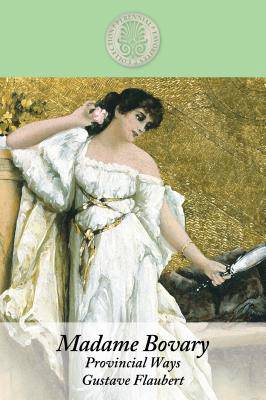
- Retrait gratuit dans votre magasin Club
- 7.000.000 titres dans notre catalogue
- Payer en toute sécurité
- Toujours un magasin près de chez vous
- Retrait gratuit dans votre magasin Club
- 7.000.000 titres dans notre catalogue
- Payer en toute sécurité
- Toujours un magasin près de chez vous
Description
A literary event: one of the world's most celebrated novels, in a magnificent new translation
Seven years ago, Lydia Davis brought us an award-winning, rapturously reviewed new translation of Marcel Proust's "Swann's Way" that was hailed as "clear and true to the music of the original" ("Los Angeles Times") and "a work of creation in its own right" (Claire Messud, "Newsday"). Now she turns her gifts to the book that redefined the novel as an art form.
Emma Bovary is the original desperate housewife. Beautiful but bored, she is married to the provincial doctor Charles Bovary yet harbors dreams of an elegant and passionate life. Escaping into sentimental novels, she finds her fantasies dashed by the tedium of her days. Motherhood proves to be a burden; religion is only a brief distraction. In an effort to make her life everything she believes it should be, she spends lavishly on clothes and on her home and embarks on two disappointing affairs. Soon heartbroken and crippled by debts, Emma takes drastic action with tragic consequences for her husband and daughter.
When published in 1857, "Madame Bovary" was deemed so lifelike that many women claimed they were the model for its heroine. Today the novel is considered the first masterpiece of realist fiction. Flaubert sought to tell the story objectively, without romanticizing or moralizing (hence the uproar surrounding its publication), but whereas he was famously fastidious about his literary style, many of the English versions seem to tell the story in their own style. In this landmark translation, Lydia Davis honors the nuances and particulars of a style that has long beguiled readers of French, giving new life in English to Flaubert's masterwork.
Seven years ago, Lydia Davis brought us an award-winning, rapturously reviewed new translation of Marcel Proust's "Swann's Way" that was hailed as "clear and true to the music of the original" ("Los Angeles Times") and "a work of creation in its own right" (Claire Messud, "Newsday"). Now she turns her gifts to the book that redefined the novel as an art form.
Emma Bovary is the original desperate housewife. Beautiful but bored, she is married to the provincial doctor Charles Bovary yet harbors dreams of an elegant and passionate life. Escaping into sentimental novels, she finds her fantasies dashed by the tedium of her days. Motherhood proves to be a burden; religion is only a brief distraction. In an effort to make her life everything she believes it should be, she spends lavishly on clothes and on her home and embarks on two disappointing affairs. Soon heartbroken and crippled by debts, Emma takes drastic action with tragic consequences for her husband and daughter.
When published in 1857, "Madame Bovary" was deemed so lifelike that many women claimed they were the model for its heroine. Today the novel is considered the first masterpiece of realist fiction. Flaubert sought to tell the story objectively, without romanticizing or moralizing (hence the uproar surrounding its publication), but whereas he was famously fastidious about his literary style, many of the English versions seem to tell the story in their own style. In this landmark translation, Lydia Davis honors the nuances and particulars of a style that has long beguiled readers of French, giving new life in English to Flaubert's masterwork.
Spécifications
Parties prenantes
- Auteur(s) :
- Editeur:
Contenu
- Nombre de pages :
- 631
- Langue:
- Anglais
- Collection :
Caractéristiques
- EAN:
- 9781410436603
- Date de parution :
- 15-04-11
- Format:
- Livre broché
- Format numérique:
- Trade paperback (VS)
- Dimensions :
- 152 mm x 231 mm
- Poids :
- 703 g







